- Home
- Brigid Kemmerer
Defy the Night
Defy the Night Read online
ALSO BY BRIGID KEMMERER
Letters to the Lost
More Than We Can Tell
Call It What You Want
A Curse So Dark and Lonely
A Heart So Fierce and Broken
A Vow So Bold and Deadly
Storm
Spark
Spirit
Secret
Sacrifice
Thicker Than Water
For Mrs. Pat Bettridge
and
Mrs. Nancy Vaughan.
Two amazing teachers
who showed me
just how powerful
the written word can be.
THE POLITICAL LEADERS OF KANDALA
NAME ROLE SECTOR
King Harristan King Royal
Prince Corrick King’s Justice Royal
Barnard (deceased) Montague Consul Trader’s Landing*
Allisander Sallister Consul Moonlight Plains
Leander Craft Consul Steel City
Jonas Beeching Consul Artis
Lissa Marpetta Consul Emberridge
Roydan Pelham Consul The Sorrowlands
Arella Cherry Consul Sunkeep
Jasper Gold Consul Mosswell
*Sometimes called “Traitor’s Landing” after the former king and queen were assassinated by Consul Montague, leaving Harristan and his younger brother, Corrick, in power.
THE OUTLAWS
NAME ROLE
Tessa Cade Apothecary
Weston Lark Steelworker
Lochlan Rebel
The Benefactors Unknown
THE CURE
The only known cure for the fever is an elixir created from dried Moonflower petals, a plant native only to two sectors: Moonlight Plains and Emberridge. Moonflower petals are strictly rationed among sectors, and quantities are limited.
Those with means can purchase their own supply.
Those without, cannot.
CHAPTER ONE
Tessa
The hardest part of this job isn’t the stealing. It’s the escaping. At best, it takes me two minutes to scale the wall out of the Royal Sector, but the night is cold, and my fingers are starting to go numb. Dawn is only an hour off, and sentry spotlights slide along the high stone walls at irregular intervals. I clutch my father’s old apothecary pack tight under my arm, clinging to the darkness, waiting for an opportunity.
Several of the sectors have electricity in the wealthy areas, or so I’ve heard, but the spotlights here are brighter than any candle has ever been—even brighter than the bonfires the towns light to burn their dead. The first time I saw them, I stared like a fool until I realized those lights meant danger. I spent days trying to figure out some kind of pattern to the surveillance, until I admitted that to Weston. He snorted and said there was no pattern, just bored men spinning a light around a pole.
They’ve been spinning this light pretty steadily for the last hour.
I flex my fingers and mentally adjust my estimate to three minutes—then bite my lip and think. The light has been returning to this section of wall at least every two.
Wes is probably at the workshop already, waiting. He can scale the stone wall in half a minute. Thanks to his height, he can leap, catch the high spires with his treble hook, then brace against the wall to bounce to the top like a cat. I’d be jealous, but it’s kind of entrancing to watch.
Not that I’d ever tell him. I’d never hear the end of it.
Entrancing, Tessa? It’s just a wall. Nothing like this. And then he’d climb a tree or do a cartwheel off the workshop roof or walk on his hands.
And then I’d have to punch him, because that would be better than him seeing the blush creeping out from under my mask, because yes, all of that is equally entrancing.
I need to stop thinking about Wes. This sentry light needs to stop spinning. I need to make my rounds, or we’ll lose days of healing. Some people don’t have days. A few might not even have hours.
I have to get out of here first. If I’m caught with a pack full of Moonflower petals, King Harristan and his brother, Prince Corrick, will tie me down in the palace gardens and let the birds peck out my organs.
Suddenly, the light stops, way down near the corner where the wall dips into shadow because of a slope. It’s where the amateurs always try to make their escape.
I’m not going to waste an opportunity. I tear out of my hiding place like a rabbit scared from a glen, my own treble hook already swinging. I can’t fling it all the way to the spires like Wes can, but I can reach the brackets that sit midway. The hook whistles up at the wall ahead of me, and I leap before it pulls taut. My boots scrape against the stone as I climb, slipping a little on the granite. I reach the bracket, the tiniest little ledge, but it’s enough to brace against while I pull the treble hook free and swing for the top. It clangs onto the spires, and up I go.
The light begins to move.
I suck in a breath and urge my feet to push me faster, higher. The pack bounces against my ribs as my feet slip and shift against the wall. My hands are burning where the rope slides. The light sweeps close, and it’s suddenly blinding.
Then I’m over the wall, half rappelling, half dropping to the forest ground like a sack of oats. I give the rope a jerk and the hook falls beside me, a little jingle in the gravel at the base of the wall. Dirt and debris cling to the homespun wool of my skirts, but I don’t dare move to brush it away. I can almost taste my heartbeat as I hold my breath and wait for the sentries to ring the alarm.
But no. Brightness glides along the edge as the light continues on its path.
I swallow my heart and wind up my hook. A crescent moon hangs high in the sky, but the barest hint of purple gleams at the horizon, a reminder that I hesitated too long, and time grows short. I slip through the forest with practiced ease, my feet silent on the fallen pine needles. I usually smell fire from the woodstove by now, because Wes always beats me back. We have a system: he starts the kettle and grinds the petals so we can make the elixir, while I weigh and divide the powder into the appropriate dosage. Then he bottles the liquid as it’s ready, I wrap it into our packs, and together we make our rounds.
But today, there’s no smell of wood smoke.
I get to the workshop, and there’s no Weston.
I think of that light stopping on the wall. My heart is in my throat again.
Wes isn’t stupid. He wouldn’t try the corner. I didn’t hear an alarm anyway.
But he’s still not here, and I’m already late.
I light the fire and try not to worry. I can hear his voice telling me to keep calm. Mind your mettle, Tessa. They’re the first words he said to me on the night he saved my life, and he’s said them a dozen times since.
He’s fine. He has to be fine. Sometimes we can’t meet at all, and one of us waits at the workshop for fifteen minutes before running solo. Mistress Solomon occasionally keeps me late, brewing and measuring and weighing the herbal remedies that she promises her customers will work—but they rarely do. Sometimes Weston’s master needs him at the forge early, because some spoiled sportsman needs a new sword or a horse has thrown a shoe. It’s happened before.
But Wes was here earlier. And he’s always back first.
The workshop is tiny and warms quickly from the fire. There’s no electricity out here, so the workshop is dim, but I don’t need much light for this. I busy my hands to keep from worry, grinding each petal into dust, careful to scrape every speck onto the tray of my scale. Even dry, they’re fragrant. The elites pay dearly for every fraction of an ounce, then waste it by drinking the elixir three times a day, even those who show no signs of disease. Preventive measures, the king calls it. Once a day is usually plenty, and I have my notes to prove it. Even Wes was distributing
too much in the beginning, until I showed him that we could help far more people with less. My father would have called it a waste. A waste of good treatment when those who can’t afford it are dying.
Then again, my father was executed for treason and smuggling, so I don’t call it anything at all. I just do what I can.
I glance out the window. The purple horizon has taken on the faintest hint of pink.
I glance at the door, as if that will make Wes appear.
It doesn’t. The kettle whistles. I divide the water into tiny measured cups and add half an ounce of ground petals to each, along with two drops of roseseed oil for the cough, which I measure out almost as carefully as the Moonflower petals themselves. I try not to steal what I can come by honestly, but roseseed nearly costs me a week’s wages, so I don’t even let Wes measure it.
Once the petals and roseseed have dissolved, I weigh in a bit of turmeric, which can bring down a fever enough to let the medicine work better, but I have to add a sprig of mint and a pinch of sugar, too. Adults don’t usually need much convincing to swallow the tincture, but we can’t risk wasting it on children who might spit it out.
From the Royal Sector, horns blast and shouts cry out, and I jump so hard that I overturn a cup. They’ve caught someone.
Wes.
I should run and see. No, I should run and hide.
My muscles refuse to do either.
Mind your mettle, Tessa.
I need to move. I need to finish. When the Moonflower is combined with the other ingredients, the elixir works better—but then they’re only good for a few hours after brewing. I need to finish our rounds, even if I have to do it alone.
The horns continue to blow. Shouting echoes in the distance. They’re going to wake half the sector. My breath has become a low keening from my throat. I imagine Prince Corrick being called down to deal with the traitor. The sentries aren’t gentle. Weston’s easy smile will be a grimace of pain. I’ll hear his screams from here. They’ll tear him apart with the tiniest knives imaginable. They’ll stuff his mouth with burning coals. They’ll feed him alive to the royal lions. They’ll burn each limb, one by one, until he loses consciousness from the—
“Lord, Tessa, you hardly need me anymore.”
I shriek and overturn another cup. There he is, in the doorway, his blue eyes bright behind the mask, his smile easy.
Weston sees the mess I’ve made and rolls his eyes. “Or maybe you do.” He moves forward and sets the cup upright. “Did you already put the powder in that one?”
I don’t know if I want to hug him or hit him. Maybe both. “You’re late. I heard the horns. I thought—I thought they caught you.”
“Not today.” He pulls the sleeves of petals from his pack, then follows them with three apples, along with a twist of sugared dough that’s still warm from an oven. “Here. The baker was out back scolding his daughter, so I swiped you some food.”
He was late because he brought me breakfast. Not just any breakfast either. Food from the Royal Sector will be the finest imaginable. The apples will be injected with honey, the twists of dough made with real butter and laced with cream and sugar.
My mouth opens. Closes. I frown and turn away. My throat is tight for an entirely new reason. “That’s very kind of you, Weston.”
“ ‘That’s very kind of you’?” he scoffs. “My, aren’t we feeling proper this morning.”
“I need to finish the elixirs.”
“I’ll finish. You eat.”
“I’ll eat in a minute.” The horns continue on the other side of the wall, but now I can ignore them. Probably another smuggler. We’ll likely see his skin suspended beside the gates tomorrow, after the king and his brother are done with the body.
“Fine.” Weston takes an apple, kicks back in the only chair, and props his booted feet up on the worktable. He wears a wide-brimmed black hat above the mask that stretches over his eyes, but he tips the hat back now that we’re in the workshop. I only ever see him by firelight, so I can’t tell exactly what color his hair is, but he usually needs a shave by now, and the faint beard growth always seems reddish brown when he sits near a candle, matching the dusting of freckles near the edge of his mask. The skin around his eyes is smudged with kohl or soot, making the blue brighter than any eyes I’ve ever seen. My own eyes are hazel green, my brown hair in a tight braid under my cap. Wes always says I look like a cat in my mask and my black jacket. Once, when I was feeling brave and cocky, I told him he should see me without the disguise so he knows what a proper young woman looks like, but his face went grave.
“Never,” he said. “It’s too dangerous. If we know what the other looks like, the information can be gained under torture. I won’t do that to you.” He paused. “And I sure don’t want you to do it to me.”
That was the first time I realized that Weston Lark probably isn’t his real name. He likely assumes Tessa Cade is fake, too, but it’s not. When we met two years ago, my parents had just been killed in front of me, and I was too racked with grief to come up with another name.
“You’re quiet,” says Wes. He loudly crunches the apple, and I want to smack it out of his hand. “What’s wrong?”
“Nothing.” I bottle the elixir I’ve already made—usually his job—and pour new cups of water to begin the process again.
Behind me, I hear him shift out of the chair and stand. He comes close enough for me to catch his scent, like the woods and the cinnamon from the bakery—but also something heavier underneath, something unmistakably Wes. “Tessa.”
I jab an elbow into his midsection, and I have the satisfaction of hearing him grunt.
“What was that for?” he demands.
“You made me worry.”
“But I brought you breakfast.” His voice is rich and deep behind me.
I ignore him.
He leans in until his breath brushes against the sliver of skin between my hair and the high neck of my jacket. The other apple appears in front of me, wrapped up in his long fingers. “It’s a really good breakfast,” he taunts.
I take the apple. Sugar dusts the skin. It’s warm to the touch, and I wonder if the honey inside is warm, too.
Despite myself, I take a bite. The honey is warm. “I hate you,” I say with my mouth full.
“That’ll probably work out for the best.” He flicks my hat up a few inches and grins. “Now eat quick,” he says. “We have rounds to make.”
CHAPTER TWO
Corrick
I’ve been listening to my brother’s breathing for hours. There’s a new sound each time he inhales, a faint stuttering in his lungs. In the Wilds, they call it the death rattle, because it means the end is near.
Here in his chambers, I’m unwilling to use the word death at all. I’m unwilling to even think it.
He doesn’t have a fever. There’s no cause to worry.
I can’t even convince myself.
Sunlight blazes through the open window, and birds trill in the trees. Harristan shouldn’t be sleeping this late, but I hate to wake him. To everyone outside the doors to his rooms, we’ve been deliberating over paperwork all morning. I’ve called for food twice, enough to feed a dozen people, but most of it sits untouched. Flies have begun gathering on the sliced fruit, and a bee drones over the pastries.
Harristan coughs faintly, and his breathing eases. Maybe that’s all it was, a tickle in his throat. A tightness in my own chest loosens, and I run a hand across the back of my neck, finding it damp.
A faint breeze nudges at my papers with enough insistence that I tuck most of them under the weight of the lamp before they can scatter across the desk. One of us has to work. I’ve been making notes along the margins of a funding request from one of the eastern cities, looking for omissions and inaccuracies in their statement demonstrating the need for a new bridge. I expected to get through only a few pages before Harristan would wake up, but now I’ve gone through the entire report and it must be nearly midday.
I tug my p
ocket watch free and glance at the glittering diamonds embedded in its face. It is midday. If he doesn’t appear at the meeting of the sector consuls, there will be talk. I can only silence so much.
As if my thoughts wake him, my brother stirs, blinking in the sunlight. He frowns at me and sits up, shirtless, then runs a hand down his face. “It’s late. Why didn’t you wake me?”
I listen to his voice carefully, but there’s no roughness to his tone, no sign of any difficulty breathing. Maybe I imagined it. “I was just about to.” I move to the sideboard and lift the kettle. “The tea has gone cold.” I pour a cup anyway and carry it to him, along with a thin corked tube of Moonflower elixir that’s darker than usual. The palace apothecary doubled his dosage last week when the coughing started again, so maybe the medicine is beginning to work.
Harristan uncorks the tube, drinks it, and makes a face.
“There, there,” I say without a lick of sympathy.
He grins. That’s something he only does when we’re alone. Neither of us smiles outside these rooms very often. “What have you been doing all morning?”
“I went through the request from Artis. I’ve drafted a refusal for you to sign.”
His expression turns serious. “A refusal?”
“They’re asking for twice what a new bridge would cost. They hid it well, but someone got greedy.”
“You hardly need me anymore.”
The words are said lightly, but they hit me like an arrow. Kandala needs its king. I need my brother.
I lock away my worries and fold my arms. “You need to dress—and shave. I’ll call for Geoffrey. I’ve said we were too busy for you to bother earlier. Quint has requested an audience with you twice, but he will need to wait until after the evening meal, unless—”
“Cory.” His voice is soft, and I go still. He only ever calls me Cory when we’re alone, one of the few reminders of childhood we have left. A nickname from when I was small and eager and trailing after him everywhere he went. A name that was once spoken in gentle fondness by our mother or encouraging praise by our father, back when we believed our family was beloved by all. Back before anyone knew about the fever, or the Moonflower, or the way our country would change in ways no one expected.

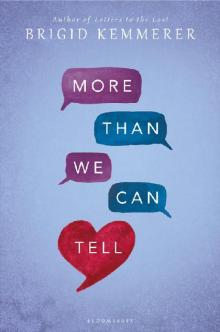 More Than We Can Tell
More Than We Can Tell Sacrifice
Sacrifice Fearless
Fearless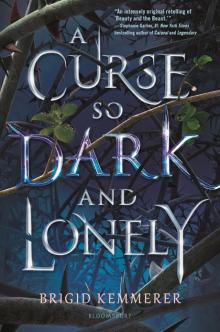 A Curse So Dark and Lonely
A Curse So Dark and Lonely Elemental
Elemental Thicker Than Water
Thicker Than Water Storm
Storm Spirit
Spirit Spark
Spark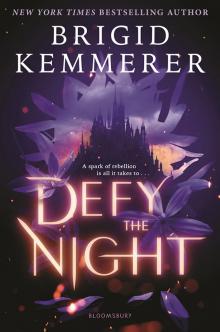 Defy the Night
Defy the Night Call It What You Want
Call It What You Want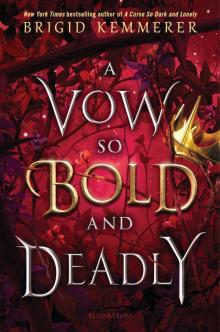 A Vow So Bold and Deadly
A Vow So Bold and Deadly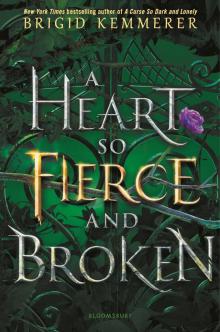 A Heart So Fierce and Broken
A Heart So Fierce and Broken Breathless
Breathless Breathless (Elemental)
Breathless (Elemental) Secret (Elemental)
Secret (Elemental)